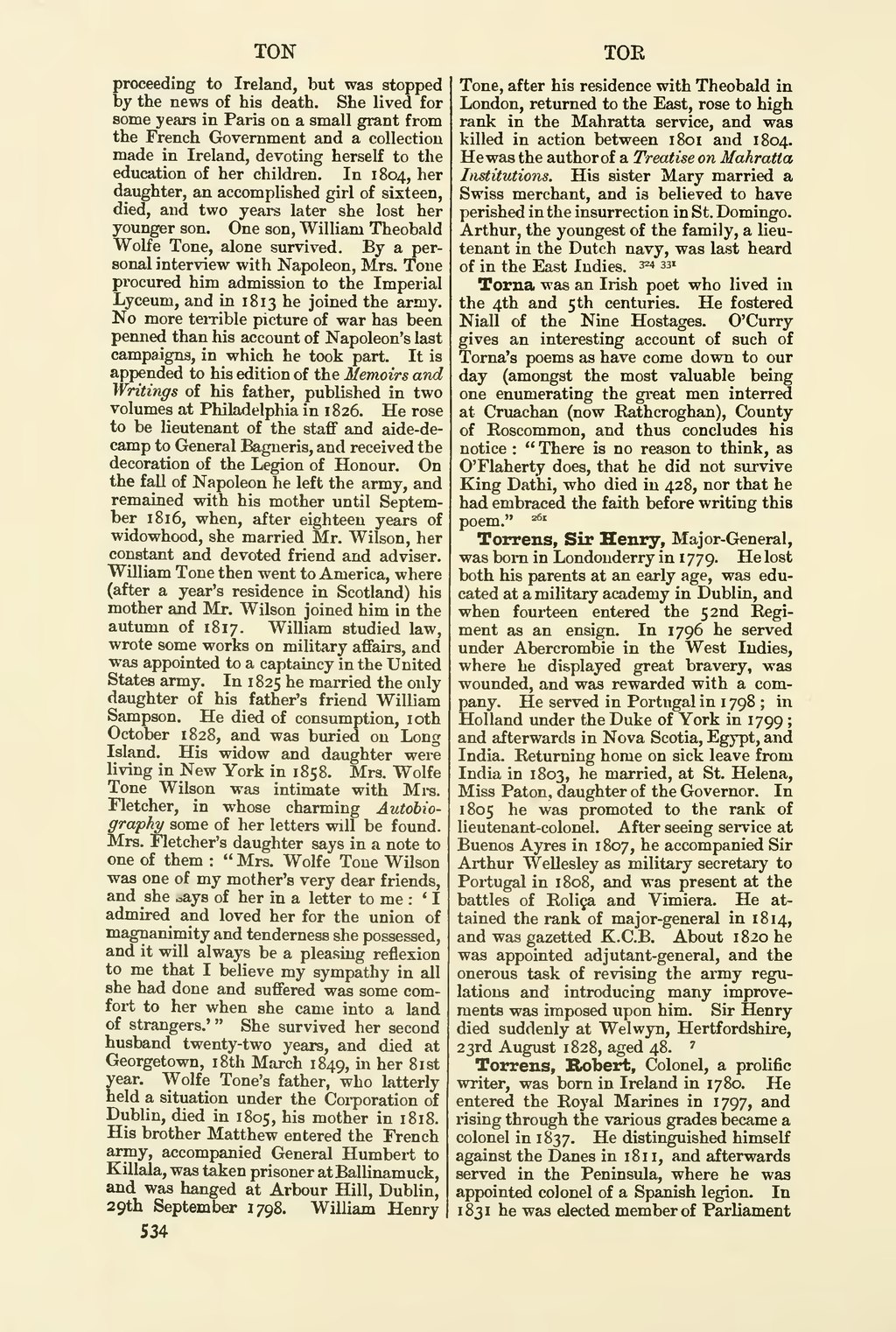proceeding to Ireland, but was stopped by the news of his death. She lived for some years in Paris on a small grant from the French Government and a collection made in Ireland, devoting herself to the education of her children. In 1804, her daughter, an accomplished girl of sixteen, died, and two years later she lost her younger son. One son, William Theobald Wolfe Tone, alone survived. By a personal interview with Napoleon, Mrs. Tone procured him admission to the Imperial Lyceum, and in 1813 he joined the army. No more terrible picture of war has been penned than his account of Napoleon's last campaigns, in which he took part. It is appended to his edition of the Memoirs and Writings of his father, published in two volumes at Philadelphia in 1826. He rose to be lieutenant of the staff and aide-decamp to General Bagneris, and received the decoration of the Legion of Honour. On the fall of Napoleon he left the army, and remained with his mother until September 1816, when, after eighteen years of widowhood, she married Mr. Wilson, her constant and devoted friend and adviser. William Tone then went to America, where (after a year's residence in Scotland) his mother and Mr. Wilson joined him in the autumn of 1817. William studied law, wrote some works on military affairs, and was appointed to a captaincy in the United States army. In 1825 he married the only daughter of his father's friend William Sampson. He died of consumption, 10th October 1828, and was buried on Long Island. His widow and daughter were living in New York in 1858. Mrs. Wolfe Tone Wilson was intimate with Mrs. Fletcher, in whose charming Autobiography some of her letters will be found. Mrs. Fletcher's daughter says in a note to one of them: "Mrs. Wolfe Tone Wilson was one of my mother's very dear friends, and she says of her in a letter to me: "I admired and loved her for the union of magnanimity and tenderness she possessed, and it will always be a pleasing reflexion to me that I believe my sympathy in all she had done and suffered was some comfort to her when she came into a land of strangers.' " She survived her second husband twenty-two years, and died at Georgetown, 18th March 1849, in her 81st year. Wolfe Tone's father, who latterly held a situation under the Corporation of Dublin, died in 1805, his mother in 1818. His brother Matthew entered the French army, accompanied General Humbert to Killala, was taken prisoner at Ballinamuck, and was hanged at Arbour Hill, Dublin, 29th September 1798. William Henry Tone, after his residence with Theobald in London, returned to the East, rose to high rank in the Mahratta service, and was killed in action between 1801 and 1804. He was the author of a Treatise on Mahratta Institutions. His sister Mary married a Swiss merchant, and is believed to have perished in the insurrection in St. Domingo. Arthur, the youngest of the family, a lieutenant in the Dutch navy, was last heard of in the East Indies.
324
331
Torna was an Irish poet who lived in the 4th and 5th centuries. He fostered Niall of the Nine Hostages. O'Curry gives an interesting account of such of Torna's poems as have come down to our day (amongst the most valuable being one enumerating the great men interred at Cruachan (now Rathcroghan), County of Roscommon, and thus concludes his notice: "There is no reason to think, as O'Flaherty does, that he did not survive King Dathi, who died in 428, nor that he had embraced the faith before writing this poem." 261
Torrens, Sir Henry, Major-General, was born in Londonderry in 1779. He lost both his parents at an early age, was educated at a military academy in Dublin, and when fourteen entered the 52nd Regiment as an ensign. In 1796 he served under Abercrombie in the West Indies, where he displayed great bravery, was wounded, and was rewarded with a company. He served in Portugal in 1798; in Holland under the Duke of York in 1799; and afterwards in Nova Scotia, Egypt, and India. Returning home on sick leave from India in 1803, he married, at St. Helena, Miss Paton, daughter of the Governor. In 1805 he was promoted to the rank of lieutenant-colonel. After seeing service at Buenos Ayres in 1807, he accompanied Sir Arthur Wellesley as military secretary to Portugal in 1808, and was present at the battles of Roliça and Vimiera. He attained the rank of major-general in 1814, and was gazetted K.C.B. About 1820 he was appointed adjutant-general, and the onerous task of revising the army regulations and introducing many improvements was imposed upon him. Sir Henry died suddenly at Welwyn, Hertfordshire, 23rd August 1828, aged 48. 7
Torrens, Robert, Colonel, a prolific writer, was born in Ireland in 1780. He entered the Royal Marines in 1797, and rising through the various grades became a colonel in 1837. He distinguished himself against the Danes in 1811, and afterwards served in the Peninsula, where he was appointed colonel of a Spanish legion. In 1831 he was elected member of Parliament
534
